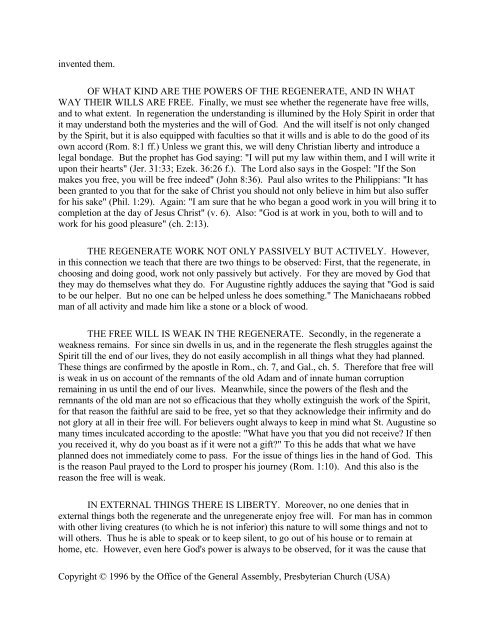The Book of Confessions - The Presbyterian Leader
The Book of Confessions - The Presbyterian Leader
The Book of Confessions - The Presbyterian Leader
Create successful ePaper yourself
Turn your PDF publications into a flip-book with our unique Google optimized e-Paper software.
invented them.<br />
OF WHAT KIND ARE THE POWERS OF THE REGENERATE, AND IN WHAT<br />
WAY THEIR WILLS ARE FREE. Finally, we must see whether the regenerate have free wills,<br />
and to what extent. In regeneration the understanding is illumined by the Holy Spirit in order that<br />
it may understand both the mysteries and the will <strong>of</strong> God. And the will itself is not only changed<br />
by the Spirit, but it is also equipped with faculties so that it wills and is able to do the good <strong>of</strong> its<br />
own accord (Rom. 8:1 ff.) Unless we grant this, we will deny Christian liberty and introduce a<br />
legal bondage. But the prophet has God saying: "I will put my law within them, and I will write it<br />
upon their hearts" (Jer. 31:33; Ezek. 36:26 f.). <strong>The</strong> Lord also says in the Gospel: "If the Son<br />
makes you free, you will be free indeed" (John 8:36). Paul also writes to the Philippians: "It has<br />
been granted to you that for the sake <strong>of</strong> Christ you should not only believe in him but also suffer<br />
for his sake" (Phil. 1:29). Again: "I am sure that he who began a good work in you will bring it to<br />
completion at the day <strong>of</strong> Jesus Christ" (v. 6). Also: "God is at work in you, both to will and to<br />
work for his good pleasure" (ch. 2:13).<br />
THE REGENERATE WORK NOT ONLY PASSIVELY BUT ACTIVELY. However,<br />
in this connection we teach that there are two things to be observed: First, that the regenerate, in<br />
choosing and doing good, work not only passively but actively. For they are moved by God that<br />
they may do themselves what they do. For Augustine rightly adduces the saying that "God is said<br />
to be our helper. But no one can be helped unless he does something." <strong>The</strong> Manichaeans robbed<br />
man <strong>of</strong> all activity and made him like a stone or a block <strong>of</strong> wood.<br />
THE FREE WILL IS WEAK IN THE REGENERATE. Secondly, in the regenerate a<br />
weakness remains. For since sin dwells in us, and in the regenerate the flesh struggles against the<br />
Spirit till the end <strong>of</strong> our lives, they do not easily accomplish in all things what they had planned.<br />
<strong>The</strong>se things are confirmed by the apostle in Rom., ch. 7, and Gal., ch. 5. <strong>The</strong>refore that free will<br />
is weak in us on account <strong>of</strong> the remnants <strong>of</strong> the old Adam and <strong>of</strong> innate human corruption<br />
remaining in us until the end <strong>of</strong> our lives. Meanwhile, since the powers <strong>of</strong> the flesh and the<br />
remnants <strong>of</strong> the old man are not so efficacious that they wholly extinguish the work <strong>of</strong> the Spirit,<br />
for that reason the faithful are said to be free, yet so that they acknowledge their infirmity and do<br />
not glory at all in their free will. For believers ought always to keep in mind what St. Augustine so<br />
many times inculcated according to the apostle: "What have you that you did not receive? If then<br />
you received it, why do you boast as if it were not a gift?" To this he adds that what we have<br />
planned does not immediately come to pass. For the issue <strong>of</strong> things lies in the hand <strong>of</strong> God. This<br />
is the reason Paul prayed to the Lord to prosper his journey (Rom. 1:10). And this also is the<br />
reason the free will is weak.<br />
IN EXTERNAL THINGS THERE IS LIBERTY. Moreover, no one denies that in<br />
external things both the regenerate and the unregenerate enjoy free will. For man has in common<br />
with other living creatures (to which he is not inferior) this nature to will some things and not to<br />
will others. Thus he is able to speak or to keep silent, to go out <strong>of</strong> his house or to remain at<br />
home, etc. However, even here God's power is always to be observed, for it was the cause that<br />
Copyright © 1996 by the Office <strong>of</strong> the General Assembly, <strong>Presbyterian</strong> Church (USA)




